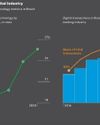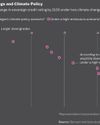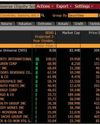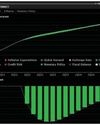
Ask Aaron Willett what the future of bourbon looks like, and he’ll take you out onto the floor of Speyside Cooperage’s outpost in Shepherdsville, Ky. There, on a recent winter day, what you’d have seen was a phalanx of 450-liter (119-gallon) Armagnac casks stacked two high. The brandy had been drained. But the oak barrels imported from France were now about to embark on a new phase of their life, poised to lend flavor to a generation of Kentucky’s finest.
Bourbon, the most American of spirits, has for decades been governed by a 1964 congressional resolution requiring that corn make up at least 51% of the mash from which it’s distilled, that it be made in the U.S., and that it be aged in virgin American oak barrels with a charred interior. And through history that’s what Kentucky distillers have done, leaving their bourbons to mature through hot summers and damp winters in warehouses filled with tens of thousands of barrels.
Now a whiskey boom and a new generation of artisanal distillers looking to differentiate themselves in an increasingly crowded market is changing the business. Tradition and American oak still live strong. But these days a growing number of bourbon makers are following the example set by Scotch distillers and adding an extra step—transferring their whiskeys from those congressionally mandated charred oak barrels to imported brandy, sherry, and port casks that add undertones to the vanilla and caramel notes that bourbon drinkers have traditionally prized.
Denne historien er fra February - March 2020-utgaven av Bloomberg Markets.
Start din 7-dagers gratis prøveperiode på Magzter GOLD for å få tilgang til tusenvis av utvalgte premiumhistorier og 9000+ magasiner og aviser.
Allerede abonnent ? Logg på
Denne historien er fra February - March 2020-utgaven av Bloomberg Markets.
Start din 7-dagers gratis prøveperiode på Magzter GOLD for å få tilgang til tusenvis av utvalgte premiumhistorier og 9000+ magasiner og aviser.
Allerede abonnent? Logg på

See Which Countries Are Falling Behind On Climate Change
Under the Paris Agreement, 190 countries and the European Union pledged to take steps to hold the global temperature rise to less than 2C (3.6F) from preindustrial levels—and preferably 1.5C.

Billionaires Vie for the Future of Brazilian Finance
An escalating battle between two billionaires is upending the financial community in São Paulo, Latin America’s wealthiest city.

Ford Foundation's Darren Walker: ‘We Have to Get Uncomfortable'
DARREN WALKER, 62, disrupted his Wall Street life more than 25 years ago when he left what is now UBS Group AG to volunteer at a school and eventually pursue a career in community development and philanthropy. Since 2013 he’s been at the pinnacle of the philanthropic world as president of the Ford Foundation, created by the family of automaker Henry Ford during the Great Depression to advance human welfare.

Fueling the Ener Transition
I MAY BE BIASED, but some of the most important research and data on the Bloomberg terminal lies in one of its lesser-known functions: {BNEF }

Dig Into Analysts' Estimates for Disruptive Companies
THE PANDEMIC ERA generated a whole wave of disruptive companies as it accelerated the introduction of new products and services in areas including artificial intelligence, digitization, electronic payments, online meeting platforms, and virtual currencies.

Climate Risks Come for Sovereign Credit
FOR YEARS climate scientists have warned about the ferocious wildfires and hurricanes that are now overwhelming many communities. Today alarms are ringing about a related financial danger: risks lurking within government bonds, the biggest part of the global debt market.

Responsible-Investing Pioneer Lydenberg Says ESG Needs An Upgrade
STEVE LYDENBERG’S passion for social change was inspired by anti-Vietnam War demonstrations, consumer boycotts, and the movement to divest from apartheid South Africa. But he didn’t take to the streets. Instead, Lydenberg turned to the world of finance to help catalyze societal change.

Engine No. 1's Grancio: ‘People Will Appreciate an Economic Argument'
ENGINE NO. 1 sent shock waves across corporate America in May when the fledgling investment firm won a boardroom battle with Exxon Mobil Corp., securing three seats on the oil and gas giant’s board after purchasing only about $40 million of its stock.

Find Out Which Companies May Ramp Up Payouts After Covid
AS THE PANDEMIC DISRUPTED business last year, many companies cut or suspended dividends. Which will boost their payouts when economies pick up again?

Get Into the Minds of Central Bankers as They Navigate Shocks
HAVE YOU EVER WONDERED how central bankers forecast the impact of shocks on the economy?